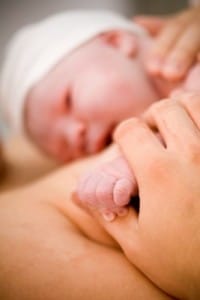
According to the researchers on the study, which was published in the most recent online version of Journal of Clinical Endocrinology, vitamin D deficiency during pregnancy could cause low birth weight by prohibiting the increased calcium absorption that usually takes place during pregnancy. They theorize that this reducing fetal bone growth, resulting in a smaller baby. Researchers on the study also said that decreased vitamin D stores during pregnancy could lead to a decrease in hormones needed to produce glucose and fatty acids needed for the growing baby.
“A mother’s vitamin D level early in pregnancy may impact that growth of her baby later in pregnancy,” lead author Alison Gernand, Ph.D., M.P.H., R.D., post-doctoral associate in the Pitt Public Health’s Department of Epidemiology told Medical News Today. “Also, if the mother was deficient in Vitamin D during the first trimester, her baby had twice the risk of suffering from growth restriction in utero.”
Dr. Gernand and her co-authors came to this conclusion after studying the data and blood of 2,146 pregnant women who had participated in the Collaborative Perinatal Project – a project that was conducted throughout 12 U.S. medical centers from 1959 to 1965 – and their birth outcomes.
Of the women included in the study – all of which had carried to term (37 to 42 weeks gestation) – women with vitamin D levels below 0.015 parts per million during the first 26 weeks of pregnancy gave birth to infants that weighed an average of 46 grams less than their same gestational-aged peers. What’s more, women who were vitamin D deficient during the first trimester – 14 weeks or less – were twice as likely to give birth to babies that fell below the 10th percentile for weight when compared to infants born during the same gestational week; this qualified them as “small for gestational age.”
“This is one of the largest studies to examine a mother’s vitamin D levels and their relationship with birth weights,” senior author Lisa M. Bodnar, Ph.D, M.P.H., R.D., assistant professor in the Pitt Public Health’s Department of Epidemiology told Medical News Today. “It shows that clinical trials to determine if you can improve birth weights by giving women of reproductive age vitamin D supplements may be warranted.”
Researchers on the study did indicate that, while the blood samples were well-preserved, a more recent, widespread study may be needed to confirm the results.
“Although the blood samples were in remarkably good condition, it would be beneficial to repate our study in a modern sample,” Dr. Bodnar said. “Today women smoke less, weigh more, have less sun exposure and get more vitamin D in their foods – all things that could impact their vitamin D levels and babies’ birth weights.”
People with darker pigmented skin are at a higher risk for being deficient in their vitamin D stores, especially during the winter. Vitamin D can be found in many of today’s foods, including breakfast cereals and dairy products. but sunlight can also provide us with vitamin D.
Related Articles:
- UK Courts Overrule Mom’s Decision to Use Homeopathic Treatment for Son’s Cancer
- Study: Family Meals may Help Increase Child’s Fruit and Vegetable Intake
- No More than Two Cups of Milk per Day for Kids, Researchers Say






